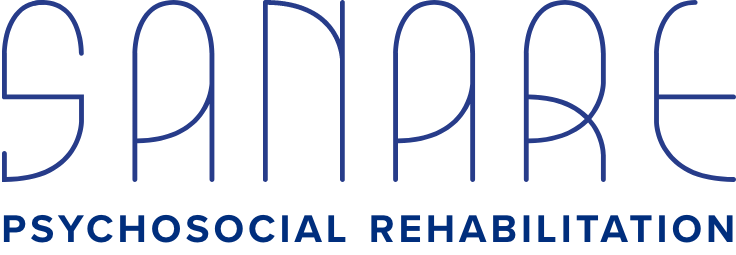Schizoaffective Disorder
Schizoaffective Disorder
Schizoaffective Disorder is a complex mental health condition that intertwines symptoms of schizophrenia, such as hallucinations or delusions, with mood disorder features, like depression or mania. Understanding this disorder is crucial, especially for families who are on the front lines, witnessing their loved ones grapple with these challenges.
Empathy and Understanding: Recognizing the struggles faced by individuals with Schizoaffective Disorder is the first step towards empathy. It's a journey that affects not just the individual but the entire family.
Navigating the Complexity: This condition is often misunderstood or misdiagnosed, adding layers of complexity for families seeking the right support and treatment.
The Importance of Knowledge: By gaining a deeper understanding of Schizoaffective Disorder, families can become more effective advocates for their loved ones, ensuring they receive the care and support they need.
In this article, we will explore various aspects of Schizoaffective Disorder, aiming to provide families with the knowledge and tools necessary to navigate this challenging journey with compassion and informed confidence.
What Is Schizoaffective Disorder
Schizoaffective Disorder is a mental health condition that presents a blend of symptoms characteristic of schizophrenia (like hallucinations or delusions) and mood disorder (such as depression or bipolar disorder). This combination can make it particularly challenging to understand and manage.
Symptom Overview
· Psychotic Symptoms: These may include delusions (false beliefs not based in reality) and hallucinations (seeing or hearing things that aren't there).
· Mood Disorder Symptoms: Individuals might experience major depressive episodes or manic episodes, characterized by feelings of extreme sadness or excessively elevated mood, respectively.
Impact on Daily Life
· The symptoms can significantly disrupt daily functioning, affecting relationships, work, and self-care.
· The unpredictable nature of the symptoms can be particularly distressing for both the individual and their family.
Variability of Symptoms
· Symptoms can vary greatly between individuals, making Schizoaffective Disorder a highly individualized condition.
· The severity and frequency of symptoms can fluctuate, often requiring ongoing adjustments in treatment and support strategies.
Understanding Schizoaffective Disorder is crucial for families as it helps in recognizing the signs and seeking timely intervention. It's important to remember that despite the challenges, many individuals with Schizoaffective Disorder can lead fulfilling lives with the right support and treatment.
Causes and Risk Factors
While the exact cause of Schizoaffective Disorder remains unclear, research suggests a combination of genetic, biological, and environmental factors play a role. Understanding these can help families grasp the complexity of the condition and foster a more supportive environment.
Genetic Factors
· Family History: A family history of mood disorders or schizophrenia can increase the risk of developing Schizoaffective Disorder.
· Genetic Predisposition: Certain genetic markers may predispose an individual to this condition, although no single gene is responsible.
Biological Factors
· Brain Chemistry and Structure: Imbalances in brain chemicals (neurotransmitters) and differences in brain structure and function may contribute to the development of Schizoaffective Disorder.
· Hormonal and Physical Changes: Physical changes, especially during critical developmental periods like adolescence, may trigger the onset of symptoms.
Environmental Factors
· Stressful Life Events: Traumatic or highly stressful events can act as a catalyst for the onset of Schizoaffective Disorder, especially in those already at risk.
· Substance Use: Abuse of drugs or alcohol can exacerbate or trigger symptoms in vulnerable individuals.
Families need to understand that these factors are not within the control of the individual and that Schizoaffective Disorder is not caused by personal weakness or a failing. Recognizing the multifaceted nature of its causes can lead to greater compassion and support for loved ones struggling with this condition.
Diagnosis and Challenges
Diagnosing Schizoaffective Disorder can be complex and often requires careful observation and professional evaluation due to the overlap of symptoms with other mental health conditions. Understanding this process is key to seeking appropriate help and support for families.
Diagnostic Criteria:
Symptom Assessment: A mental health professional will assess for the presence of both psychotic symptoms (like hallucinations or delusions) and mood disorder symptoms (depression or mania).
Duration: Symptoms must be present for a significant period and impact daily functioning.
Challenges in Diagnosis:
Overlap with Other Conditions: Symptoms of Schizoaffective Disorder can overlap with schizophrenia, bipolar disorder, and major depressive disorder, making accurate diagnosis challenging.
Evolving Symptoms: The symptoms can change over time, requiring ongoing assessment and possibly adjustments in diagnosis.
Importance of Accurate Diagnosis:
Tailored Treatment: An accurate diagnosis is crucial for developing an effective treatment plan that addresses both the psychotic and mood disorder aspects of the condition.
Family Understanding and Support: Understanding the specific challenges of Schizoaffective Disorder helps families provide targeted support and reduces the stigma often associated with mental health diagnoses.
For families, being part of the diagnostic process can be both challenging and essential. It involves patience, observation, and working closely with healthcare professionals to ensure their loved one receives the most accurate diagnosis and effective treatment plan.
Sanare's Wraparound, Holistic Approach Utilizing Psychosocial Rehabilitation
At Sanare Psychosocial Rehabilitation, the focus is on empowering individuals with Schizoaffective Disorder. Recognizing that each person's experience with Schizoaffective Disorder is unique, Sanare tailors its approach to meet individual needs. The goal is not just symptom management, but enhancing overall life satisfaction and functionality. By addressing the emotional, social, and practical aspects of living with Schizoaffective Disorder, Sanare aims to support individuals in leading more connected and purposeful lives by integrated many of the approaches discussed below.
Treatment Options
Treating Schizoaffective Disorder typically involves a combination of medication, psychotherapy, and other support strategies. Families need to understand these options to effectively support their loved ones through the treatment process.
Medication
· Antipsychotics: These are used to manage symptoms like hallucinations and delusions.
· Mood Stabilizers and Antidepressants: These help in regulating mood swings and treating depressive symptoms.
· Integrated Approach: Often, a combination of medications is used to address the complex nature of the disorder.
Psychotherapy
· Individual Therapy: Cognitive-behavioral therapy (CBT) and other forms of therapy can help individuals understand and manage their condition.
· Family Therapy: This can be crucial in helping families understand the disorder and learn how to support their loved one effectively.
Lifestyle and Supportive Therapies
· Stress Management: Techniques like mindfulness and relaxation can help in managing stress, which is important in reducing symptom severity.
· Support Groups: Both individuals with Schizoaffective Disorder and their families can benefit from support groups, which provide a space for sharing experiences and coping strategies.
Holistic Approach
· Physical Health: Regular exercise, a healthy diet, and adequate sleep are important for overall well-being.
· Consistent Routine: Establishing a daily routine can help in managing symptoms and improving quality of life.
Treatment for Schizoaffective Disorder is highly individualized. Families need to work closely with healthcare professionals to find the most effective treatment plan for their loved ones. Patience and understanding are key, as adjustments in treatment may be necessary over time.
Supporting a Loved One with Schizoaffective Disorder
When a family member is diagnosed with Schizoaffective Disorder, the support and understanding of their loved ones become invaluable. Here are some ways families can provide meaningful support:
Educate Yourself and Others
· Understand the Disorder: Learn about Schizoaffective Disorder to better understand what your loved one is experiencing.
· Educate Others: Help friends and extended family members understand the condition, reducing stigma and misconceptions.
Emotional Support
· Listen Actively: Offer a listening ear without judgment, allowing your loved one to share their feelings and experiences.
· Encourage Open Communication: Foster an environment where your loved one feels safe to express themselves.
Practical Support
· Assist with Treatment: Help your loved one keep track of their medication, appointments, and therapy sessions.
· Daily Routines: Support them in maintaining a healthy and structured daily routine.
Self-Care for Caregivers
· Take Care of Your Own Health: Managing the stress and demands of caregiving is crucial for your well-being.
· Seek Support: Consider joining support groups for families of individuals with mental health conditions.
Advocate for Your Loved One
· In Healthcare Settings: Be an advocate for your loved one in interactions with healthcare professionals.
· In the Community: Work towards creating a more understanding and supportive community for those with mental health conditions.
Remember, the journey with Schizoaffective Disorder is not only challenging for the individual but also for the family. Your support, understanding, and compassion can significantly impact your loved one's life.
Conclusion
In this article, we've explored the multifaceted nature of Schizoaffective Disorder, a condition that intertwines symptoms of schizophrenia and mood disorders. Understanding this complex disorder is crucial for families who are navigating this challenging journey alongside their loved ones.
Key Takeaways:
Schizoaffective Disorder is a blend of psychotic and mood disorder symptoms, making it a unique and often misunderstood condition.
The causes are multifactorial, involving genetic, biological, and environmental factors.
Diagnosis can be challenging due to symptom overlap with other mental illnesses, but it's essential for effective treatment.
Treatment typically involves a combination of medication, psychotherapy, and supportive strategies.
Family support plays a critical role in the management and well-being of individuals with Schizoaffective Disorder.
Encouragement for Families:
Your role in supporting a loved one with Schizoaffective Disorder is invaluable. Education, empathy, and patience are key.
It's important to remember that with the right treatment and support, many individuals with Schizoaffective Disorder lead fulfilling lives.
Don't hesitate to seek professional help and join support networks. You are not alone in this journey.
We hope this article has provided valuable insights and guidance for families facing the realities of Schizoaffective Disorder. Remember, understanding, compassion, and informed care can make a significant difference in the lives of those affected by this condition. Reach out to Sanare and seek help from professionals who care.

